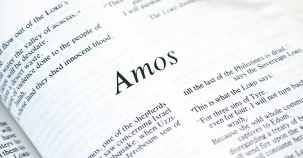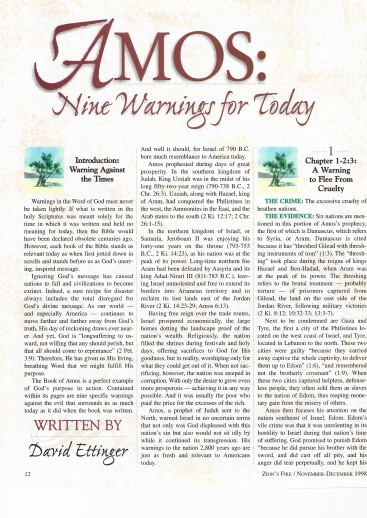By David Ettinger
For those who don’t know, I have been a longtime writer for the magazine Zion’s Fire. Here’s one I wrote from 1998, and felt it would make for a good blog series, to run in four parts. (I freshened it up a tad.) Today, Warnings 8, 9, & Conclusion. Read Part 1 here. Read Part 2 here. Read Part 3 here.
Warning 8: Reviling God’s Holy Days (Chapter 8)
The Crime: The Sabbath and festivals designed to honor God became a burden to Israel (v. 5) in that those days prevented the people from conducting business. The Israelites would impatiently endure those special days and could not wait for them to end so they could return to the deceptive ways.
 The Evidence: The northern kingdom of Samaria had become a place where people disdained God’s holy days because of their inconvenience they caused: “When will the New Moon be over that we may sell grain, and the Sabbath be ended that we may market wheat?” (v. 5). God’s holy days had become an annoyance at best and were regarded as an unproductive interruption of business at worst. The festival days in which no man or woman worked served only as a means by which the business community stored frustration, passing the time by concocting new ways to cheat both each other and the poor.
The Evidence: The northern kingdom of Samaria had become a place where people disdained God’s holy days because of their inconvenience they caused: “When will the New Moon be over that we may sell grain, and the Sabbath be ended that we may market wheat?” (v. 5). God’s holy days had become an annoyance at best and were regarded as an unproductive interruption of business at worst. The festival days in which no man or woman worked served only as a means by which the business community stored frustration, passing the time by concocting new ways to cheat both each other and the poor.
Judgment: Because the people considered God’s way burdensome, He would punish them by sending “a famine through the land – not a famine of food or a thirst for water, but a famine of hearing the words of the Lord” (v. 11). Realizing they had lost a precious commodity, the Israelites would search desperately to re-find it (v. 12). Worst of all was that those who would go searching for the Word would not find it and would perish doing so (vv. 13-14).
Warning for Today: If any chapter of Amos speaks to Christians in the West today, it is this one. To many of us, attending church and Bible study on Sundays has become a burden. Between sporting events on TV and places to visit, there is just so much to do on Sundays that church simply gets in the way. And yet, the doors to Western churches remain open, and many professed Christians loathe walking through them. Just as Israel shut the door to God’s Word which He so freely opened, so could the Lord seal off His Word in the West if we continue to revile the special day set apart for us to worship Him corporately.
Warning 9: Do Not Flee from God (Chapter 9)
 The Crime: When Israel was confronted by the prophets with the punishment God would bring upon her for disobedience, the nation chose to flee rather than seek Him. Anything, it seemed, was better than repenting; even if it meant digging deep into the depths of the earth (v. 2), climbing to the highest heights (v. 2), hiding in the mountains (v. 3), concealing themselves in the sea (v. 3), and going into captivity (v. 4).
The Crime: When Israel was confronted by the prophets with the punishment God would bring upon her for disobedience, the nation chose to flee rather than seek Him. Anything, it seemed, was better than repenting; even if it meant digging deep into the depths of the earth (v. 2), climbing to the highest heights (v. 2), hiding in the mountains (v. 3), concealing themselves in the sea (v. 3), and going into captivity (v. 4).
Judgment: Plain and simple, destruction. To the sinful nation – any sinful nation – God vows to “destroy it from off the face of the earth” (v. 8). The sinners, God promises, “will die by the sword” (v. 10). The day will come when the Lord will rid the earth of all who disdain Him, and there will be no place to hide.
Warning for Today: Throughout the world, there is a multitude of voices proclaiming Jesus as Savior and of salvation coming only through Him. Yet, governments in Third World and Communist nations persecute those who believe and preach it. In the West, more and more laws are being passed against teaching God’s Word and proclaiming one’s faith in public places. Rather than embrace God’s Word, millions flee from it despite the promise that He will destroy those who do so.
Conclusion
Following the nine warnings so vividly depicted by Amos, the prophet ends his book with the glorious promise of Israel’s restoration – specifically, the planting in the Millennial (1,000-year) Kingdom of the remnant which will come to accept the messiahship of Jesus Christ (v. 15). Best of all is the glorious promise from God to anyone who accepts the warnings of Amos, repents and turns to God, that the Lord “plant [them] in their own land, never again to be uprooted from the land I have given them” (9:15).
Haggai: 8 Lessons in Priorities (Part 1)
Haggai: 8 Lessons in Priorities (Part 2)
Haggai: 8 Lessons in Priorities (Part 3)
Haggai: 8 Lessons in Priorities (Part 4)
Lisa Beth
February 26, 2018
Amos 8, Warning for Today is on target. I think our generation may have the distinct sadness of witnessing this transition from Sunday worship to free fun day. More than ever, on the way to church, I see youths gathering on every field and indoor track. Maybe worse are the carnal allurements that churches employ to attract congregants, even building gymnasiums. The answer to apostasy is not diluting the truth but proclaiming it with passion!
Thank you David for these succinct teachings.
LikeLiked by 1 person
dettinger47
February 26, 2018
Thank you for the kind words, Lisa. You nailed it regarding the “carnal allurements that churches employ.” Unfortunately, this has been going on for a long time, and I see it only increasing.
LikeLiked by 1 person
Evad Mac
February 27, 2018
Hey there, I’m wondering if you have blogged about The Sabbath and festivals designed to honor God and whether they are a command for all time and people and for us to obey today?
Thanks for posting
LikeLiked by 1 person
dettinger47
February 27, 2018
Hi Dave, all the festivals, Sabbath included, were fulfilled in Christ and not required today. I wrote a series of blogs regarding the Sabbath and the Mosaic Law. Here are the links:
https://ettingerwriting.wordpress.com/2017/03/10/why-christians-dont-observe-the-old-testament-sabbath-2/
https://ettingerwriting.wordpress.com/2017/03/15/are-christians-required-to-eat-kosher-food-2/
https://ettingerwriting.wordpress.com/2017/03/13/jesus-the-mosaic-law-and-the-christian-2/
LikeLiked by 1 person
heavensreef
February 27, 2018
David,
Love how you have tied all of the warnings in Amos to today…….oh how you can see “us” in them and oh how we are repeating history! I have tried in my own life to honor the Sabbath as much as I can. It is the LORD’S DAY period. Those of us that can, need to shout the truth! Thank you for your links on the Sabbath and Mosaic Law…….will check them out!
LikeLiked by 1 person
dettinger47
February 27, 2018
Thank you for the kind words, Maxine!
LikeLike
lynnabbottstudios
March 3, 2018
I don’t know how I’ve missed so many of your wonderful posts, David! I think that for some reason, WordPress isn’t sending me email notifications when you post. I’m going to have to figure this out, because I hate missing your wonderful teaching. This was an outstanding post… very convicting regarding the church and our attitudes toward it. Thank you! I think that if believers as a whole would return to a love of Scripture and the study of it, there would be a great revival in our nation. Thank you; thank you for your faithful teaching of God’s Word. God bless you big time!
LikeLiked by 1 person
dettinger47
March 3, 2018
Thank you for the kind words, Lynn. Regarding missed blogs, I get those myself from others. For instance, I don’t get notices from a common friend of ours, Bruce, though I follow his blog. To make up for this, twice a week I click on “Reader,” and there I’m able to find out the blogs I was never notified on.
LikeLiked by 1 person